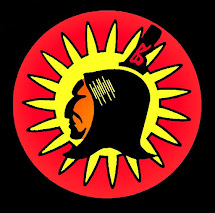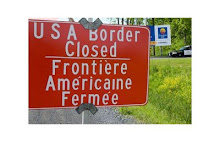Thursday, July 23, 2009
Native to Native Business is Criminalized and Over Regulated by Federal, State and Tribal Governments
The Commerce Clause of the US Constitution states that "The Congress shall have the power to regulate commerce...with Indian Tribes." So even in their law, only Congress has any authority when it comes to Native commerce, not the States. And the "power" the US Constitution provides is only for their commerce with Native people, not the commerce of Native people. So in this alleged era of "Self Determination", why are State and Federal prosecutors constantly charging Native businessmen, seizing accounts and generally interfering with Native to Native commerce? And why have Tribal governments not only complied with so many state and federal commerce laws but in some instances outlawed Native to Native business?
We are often asked by non-native people; why don't Native people work together and become more united? Beyond the role that the diversity of our cultures and geography plays, we also find ourselves all over the map on sovereignty and assimilation into American and Canadian law and governance. Tribal and Band Councils generally exist as extensions of the federal governments and rely on their federal recognition for funding and authority. Rarely will you find a Tribal or Band Council take much of an interest, let alone a position of support in a conflict or issue in another Native community. The People on the other hand quite often are engaged in supporting each other. There is a disconnect between the unity felt by Native people and the tunnel vision of tribal governments. Just as the state/provincial and federal powers try to limit the power of Native people, so do tribal governments. Consolidation of power is a tribal government function. Signature authority, tribal courts, tribal police; these are all about reducing the masses to only a few manageable individuals or institutions for the outside to deal with. Certainly the prospect for US or Canadian officials of dealing with a million individual Indians, who believe they are sovereign, is scary and unacceptable.
So where does this leave us when it comes to Native people trying to forge economic ties with people from other Native communities? Pretty much on our own or worse, fighting our own tribal leaders. In spite of this, it is too important an issue and it must be elevated in our conversations and our development. We must promote and support Native to Native business and condemn, loudly if necessary, all those who work against it. Tribal leaders must be called out on any tribal regulations that obstruct commerce with other Native communities and any collusion with outside authorities to charge or otherwise obstruct our people. Native to Native commerce should be pushed into the conversations in Washington and Ottawa. Obama should be held to all his rhetoric and overtures to Native people about his concern for our well being. The new buzz in Indian Country must become N2N or NDN2NDN commerce.
I will be featuring a series of articles addressing Native to Native commerce. Features will include coverage of prosecutions of Native businessmen, obstacles imposed by state, federal and tribal governments and opportunities that need to be developed.
Monday, July 6, 2009
Day 36: Confusion and Indecision Shown by U.S. Customs
In the wake of Canada's Canada Day celebrations and on the United States' Independence Day, cracks began showing through on the US side of the blockade at Akwesasne. It was inevitable that with any number of normal events and occurrences that could fan the flames of the current standoff between the Kanienkehaka and the US and Canadian Borders Services that such an event would occur.
This event was as natural as life itself: a death of an elder in the community. The issue in this instance is that the Longhouse is on the south side of the River and the Longhouse cemetery is on the Island. After approaching US Customs multiple times to cease their illegal blockade of the bridge to Kawenoke, otherwise known as Cornwall Island, and allow this funeral to proceed as they have for generations, Customs refused to yield to the friends and family of the lost loved one. As the funeral was underway more and more People from the community of Akwesasne became disturbed by the refusal of the US authorities to back down from its ridiculous stance.
US Customs officials began to see more and more Mohawk People assembling at their door step and became concerned about being approached from the Island side as well. As the thirty to forty men came down from the bridge on foot to the customs booth rumors of hundreds more were sweeping through the crowd. As these men approached they noted the Border Patrol assembled under the bridge with their K-9 units. The New York State Police arrived to back up the customs agents and border patrol as the numbers of gathering Kanienkehaka continued to grow.
The first crack appeared when the border agents suggested that only the body of the passed on elder would be allowed to pass and that all others would have to enter through other border crossings. This concession must have sounded as stupid to those offering it as those rejecting it.
Finally, as the Longhouse funeral ceremony was finishing, the agents conceded, claiming they had gotten approval to allow the procession access to the bridge that had been blocked for 34 days.
The good decision to stand down and allow the funeral to proceed to the cemetery only stands now to confuse the issue. Will US Customs continue to be doormen or security guards for Canada? Is this, in their view, a one-time event? If so, then why would a funeral justify access from one part of our community to another, but not the need to check on a loved one or a child going to and from school. Is it just a numbers game? So what is the punch line to: How many Mohawks does it take to cross a bridge?
We should all thank Dave Richmond. He may have once again shown us the importance of our numbers. Even as the logs and embers were scattered we gathered to stand together not just to honor his life but to oppose the actions that dishonor all our lives. The United States didn't show compassion to the Kanienkehaka on the 4th of July. It showed that there is no justification for the role they are playing. All the bullshit about International policy and protocol turns out to be just as we suspected: bullshit. The events of this weekend established clearly that denying Onkwe Ohnwe access to Kawenoke is an arbitrary judgement call. Today between noon and 1PM a group of ten to twenty community residents crossed again to the Island from the South. It may be premature to suggest that our people have regained full access to the island portion of Akwesasne, but Dave may have started the beginning of the end of the blockade and for that we thank him.
Subscribe to:
Posts (Atom)













![-[]-[]-/\-[]-[]-](https://blogger.googleusercontent.com/img/b/R29vZ2xl/AVvXsEjLoXmKO8PJVQ5pZ2q7GX7nFKw8H2tb28dxt-o10FUBNtOGszWhWoLB7tgjtMgtISpuSxNW3fcDxfuSS2DqojsdjNJ1lVggyUS374PnzsDbOhk4ukvtTunFQcyfkckZeBzcLbri4LDYN_E/s214/29-03-A-voice-from-the-Akw-.jpg)




